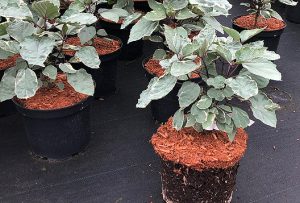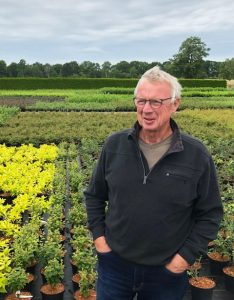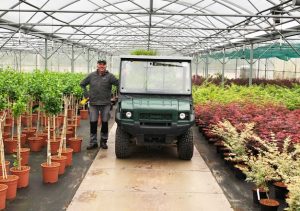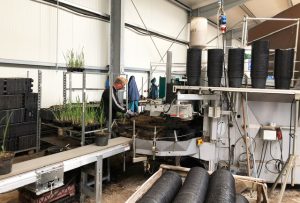A high proportion of alternative constituents
GreenFibre and container mulch combine very well
Ehlers, a tree nursery in the German town of Westerstede, is among Klasmann-Deilmann’s customers. It uses a container substrate with 25% GreenFibre, and also containermulch. This is a recipe not only for good plant growth; the high proportion of alternative constituents also helps ensure sustainable production.

Our growing media offer roots ideal support. Both root balls and the layer of container mulch on top remain stable even without a pot.
Tree nursery Ehlers has been a Klasmann-Deilmann customer since 2016. The contact for this account is Holger Buderich, a German member of our field sales team. “We supply container substrate containing a wetting agent,” he explains. “There are actually two different products: a medium with a pH of 4.5 for ericaceous plants and grasses, and a substrate with a pH of 5.2 for deciduous plants and conifers. And Ehlers also uses our containermulch.” Thus combined, the high proportion of renewable resources adds up to a lot. “GreenFibre makes up 25% of the container substrate, and use of containermulch as a covering material means that, on a per-pot basis, alternative constituents account for around 40% of our products utilised here,” reports an enthusiastic Buderich.
Klasmann-Deilmann’s wood fibre product saves time and adds quality

Senior manager Jürgen Ehlers.
The Ehlers tree nursery is delighted with these products sourced from Klasmann-Deilmann. “Chiefly due to the use of containermulch, the need for herbicides has been virtually eliminated. And our staff now have to devote only very little time and effort to weeding,” says senior manager Jürgen Ehlers. “Also, especially in summer, there is another noticeable effect: covering with mulch reduces water evaporation, and we don’t need to water so often. So the use of raw wood materials means we save not only peat, but water as well.”
A supplier of garden centres, the Ehlers tree nursery is additionally benefitting in terms of preparing pots for dispatch. Addition of container mulch makes the process 20% less time-consuming, as there is no need to remove weeds and liverworts.
More alternative constituents, less need for water, lower herbicide use, less manual work. “This means that, using Klasmann-Deilmann products, we have achieved a highly sustainable production system,” Jürgen Ehlers concludes.

A wide range of plants are grown for supply to garden centres. Under Jürgen Ehlers, the firm has developed from being a supplier of other tree nurseries to a business that directly sells to owner-operated garden centres and wholesalers.

Since 2019, the tree nursery has been operating a new indoor facility for potted plants. It includes a substrate storage unit and a new potting machine with a mulcher. The facility also has a buffer conveyor and a fork-lift with forks for positioning pots.